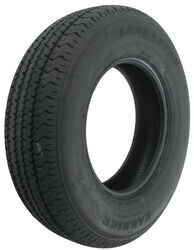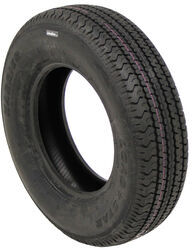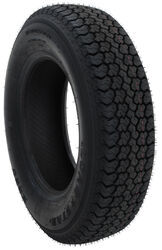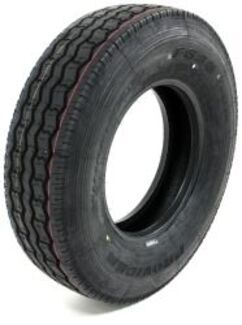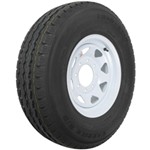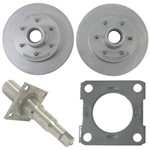
Comparing Special Trailer Tires in Size ST205/75-14 with Differing Load Range Ratings
Question:
Which is better trailer tire 205 75D 14 or 205 75C 14?
asked by: Andrew
Expert Reply:
The only actual differences between two special trailer tires in the same size but with different weight load range letter codes, C and D in this case, are their weight carrying limits in pounds and their required inflation pressures in psi. For reference, the linked page displays all of our special trailer (ST type) tires in size ST205/75-14.
These tire options include items with either radial or bias ply construction and tires in either Load Range C or D. As examples, Kenda # AM10234 is a Load Range C, meaning good to 1,925-lbs at its 60-psi inflation pressure; or the Load Range D tire # AM10235 is good to 2200-lbs at its rated 75-psi pressure.
The benefit of using tires that can handle more weight than you're actually putting on them is that they will tend to run cooler. Tires used near their limits naturally tend to run hotter, and this heat is the root cause for much trailer tire failure. By selecting tires that offer a good safety margin in their weight rating you build in some insurance, so to speak.
The other main causes for undesirable heat build-up in a tire are incorrect inflation pressure (either too low or too high) and operating the tire at speeds higher than that for which it is rated. Some special trailer tires, such as D-rated # AM10235, are rated for highway speeds up to 81-mph. If you routinely drive at 70 to 75-mph on the interstate, then you really want to use tires rated for higher speed. If we do not specifically call out a speed rating in a tire's specs, then that means its speed rating defaults to 65-mph. Of course, it is never a good idea to run tires at higher speeds than what they are intended to handle.
Any brand, type or rating of special trailer tire will last longer if you always observe rated weight, pressure and speed.

Products Referenced in This Question
Karrier ST205/75R14 Radial Trailer Tire - Load Range C
- Trailer Tires and Wheels
- Tire Only
- Radial Tire
- Load Range C
- 205/75-14
- 14 Inch
- M - 81 mph
- Kenda
more information >
Karrier ST205/75R14 Radial Trailer Tire - Load Range D
- Trailer Tires and Wheels
- Tire Only
- Radial Tire
- Load Range D
- 205/75-14
- 14 Inch
- M - 81 mph
- Kenda
more information >
Product Page this Question was Asked From
Loadstar ST205/75D14 Bias Trailer Tire - Load Range C
- Trailer Tires and Wheels
- Tire Only
- Bias Ply Tire
- Load Range C
- 205/75-14
- 14 Inch
- Kenda
more information >
Featured Help Information
Miscellaneous Media

Continue Researching
- Article: Trailer Tire Sizing
- Shop: Loadstar ST205/75D15 Bias Trailer Tire with 15" White Wheel - 5 on 5 - Load Range C
- Shop: Karrier ST205/75R15 Radial Trailer Tire with 15" White Wheel - 5 on 5 - Load Range C
- Shop: Trailer Spare Tire Mount by Dutton-Lainson
- Search Results: 15x5j
- Search Results: st205 75r15
- Shop: Dexter Heavy-Duty Suspension Kit for Tandem-Axle Trailers - 1-3/4" Wide Double-Eye Springs
- Video: Dexter Heavy Duty Suspension Upgrade Kit Review
- Video: Dexter Tandem Axle Trailer Heavy-Duty Suspension Kit Installation
- Video: Review of MORryde Trailer Leaf Spring Suspension - Rubber Equalizers - MR34AR
- Video: MORryde Tandem Axle Trailer Rubber Equalizers Manufacturer Demo
- Shop: Dexter Heavy-Duty Suspension Kit for Tandem-Axle Trailers - 1-3/4" Wide Double Eye Springs
- Shop: MORryde 14-3/4" Shock Absorbing Equalizers for Tandem Axle Trailers w/ 42" Wheelbase - 8K
- Q&A: Best Trailer Tire for Tire Size 205/75-14
- Video: Review of Dexter Axle Trailer Leaf Spring Suspension - Equalizers - K13-142-02
- Video: etrailer Trailer Suspension - Leaf Spring Suspension - AP233 Review
- Video: Review of Blaylock Industries Trailer Coupler Locks - Surround Lock - BLTL-33
- Shop: MORryde Suspension Upgrade Kit for Tandem Axle Trailers - 3-1/8" Long Shackle Straps
- Shop: RV Covers
- Q&A: Recommended Trailer Coupler Lock for a 2-5/16
- Search Results: equalizer
- Search Results: tekonsha 90195 p3
- Shop: Brake Controller
- Q&A: Benefits of Changing to Larger Diameter Radial Trailer Tires on Travel Trailer
- Q&A: What is the Difference Between Load Range C and D ST175/80D13 Trailer Tires
- Q&A: Comparing Trailer Tires that Have R and D in the Size, Radial vs. Bias-Ply
- Q&A: Can I Use A ST205/75R14 For A Spare Tire On Trailer With ST205/75D14 Tires
- Q&A: Replacement Trailer Tires for Size F78-14 Tires on a Boat Trailer
- Article: 7 Common Questions Everyone Has About Trailer Tires
- Article: How to Measure Your Trailer Wheel Bolt Pattern



